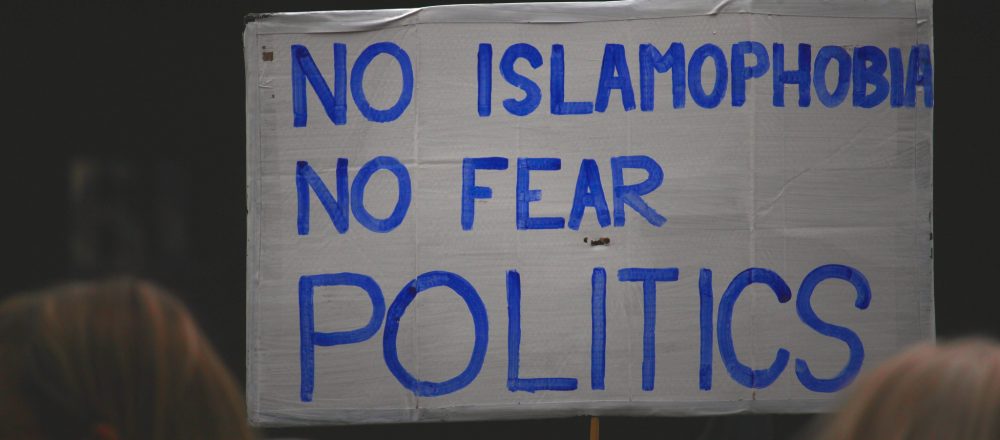As the results of the federal election gradually trickle in, one thing seems abundantly clear: fear is the most effective political tool today. Labor proved it with a scare campaign about Medicare, making up some of the ground it lost in the last election, while the Liberal party was hurt by no longer having asylum seekers to rave about, as they have, quite literally in several cases, beaten that cause to death. Given their one claim to good governance was ending a trumped-up menace or “stopping the boats”, they could hardly use that as a threat again, instead making vague noises about the economy. Meanwhile, reports indicate that Pauline Hanson’s party, One Nation, after two decades of political rejection, will pick up at least one seat in the Senate, with the possibility of others, thanks in large part to waves of anti-Muslim bigotry.
In other words, fear is a politician’s best friend. And currently, there are few figures as frightening as a stereotypical Arab Muslim. 20 years ago, Pauline Hanson thumped the bigot drum against Asian immigrants saying “the yellow race would swallow up the world” and was vehemently racist toward Indigenous people, calling native title a scam, and questioning the 1967 referendum which gave them the right to vote: “if Australians knew today what had been foreshadowed for them they would have thought twice about casting that vote.”
I mention this because it’s currently NAIDOC week, a week that celebrates Indigenous culture and history, and the return to politics of a racist figure like Pauline Hanson is particularly abhorrent at this time. I mention it, too, to illustrate that fear is cyclical, that it wears many faces, and bigots will seize on whichever group is the focus of public scrutiny to achieve their ends. When reactionary figures like Pauline Hanson, Donald Trump, and Nigel Farage come to political prominence on the back of prejudice – which itself is fostered by hysterical media – there is a distinct cost on the bodies they demonise.
A week ago, a car bomb was set off outside an Islamic College in Perth. On Sunday, three men ambushed and shot a Muslim doctor heading for morning prayers at a mosque in Houston. In the first week after the British voted to leave the EU, a referendum dominated by a xenophobic campaign, hate crimes rose 57 per cent. The kind of rhetoric favoured by these figures is aimed at a beleaguered white middle class who, in light of economic uncertainty, feel a sense of lost control, forgetting their idea of what is equitable is based on the oppression of others. It is a rhetoric that is almost always followed by violence, whether in the form of legislation exacting a cost on our lives, or physical and verbal abuse aimed at those of us who are most visible, like women who wear the hijab.
Modern politics thrives on xenophobia.
In saying this, however, there is a perverse glee mainstream media and politicians take in pointing out the obvious bigotry espoused by the likes of Pauline Hanson, as if to say, “we’re not like them”. And yet, modern politics thrives on xenophobia. It wasn’t Pauline Hanson who wanted to displace 100 remote Indigenous communities in WA, it was the elected government there, and it wasn’t she who said Indigenous people were making a “lifestyle choice” by refusing to abandon their traditions, and ancestral homeland, it was the sitting Prime Minister, Tony Abbott.
It wasn’t Pauline Hanson who suspended the Racial Discrimination Act to enact the devastating military intervention in the Northern Territory. It was the then Prime Minister, John Howard – the affects of which are still being felt today. It wasn’t this cartoonish figure of ridicule who created the cruel and inhumane offshore detention centres where refugees are incarcerated, nor did she pass shady laws which target dual nationals, effectively making them second-class citizens without due process. Though it’s worth mentioning that the likes of Hanson can force conservative governments to shift even further to the right, the point I want to make is that we shouldn’t pretend bigoted politics is the province of fringe, far-right politicians when it is evident all throughout the history of this country.
After more than a decade of giving over our right to privacy, of giving government and law enforcement agencies unheard of power to survey what we say, who we say it to, what we look up online, what we download; after more than a decade of increasingly invasive strictures, of longer and longer airport queues and demands, taking off our belts and shoes and limiting what can and can’t be bought; after more than a decade of allowing wars to continue overseas and accepting endless drone strikes with their ghastly civilian cost as the price of doing business; after more than a decade of the burqa and the beard becoming talismans of fear, the fetishised scapegoat of terrified populations – after more than a decade, in short, of allowing ourselves to be whittled into smaller and smaller observable shapes, easily controlled, ask yourself this: do you feel any safer? Do you feel any less afraid?
By all means, point at Pauline Hanson and her merry band of fools, but don’t forget our career politicians and Prime Ministers can be every bit as dangerous, if not more so, for being effective at enacting their policies.
Nothing will change until we stop allowing fear to be the bedrock of modern governance. Nothing will change until we elevate not the worst of us, who promise a return to the even more oppressive past, but the best of us, who can envision a new future in which we work together to undo institutionalised inequality and overcome the challenges of the day, whatever they may be.



